小升初英语——一般现在时
小升初英语一般现在时练习题30题
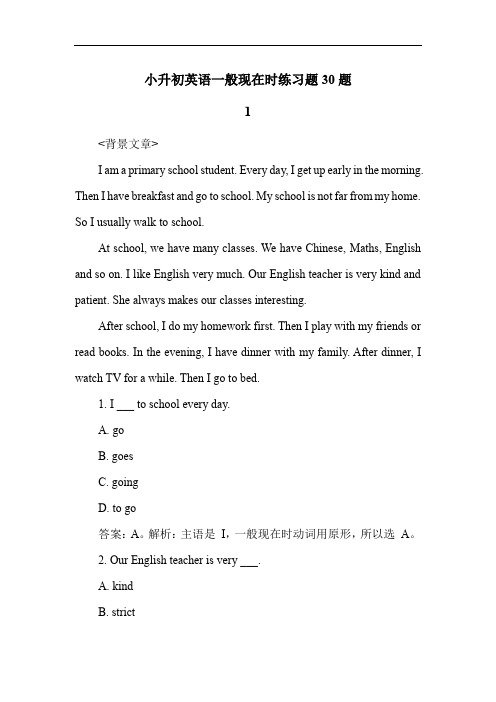
小升初英语一般现在时练习题30题1<背景文章>I am a primary school student. Every day, I get up early in the morning. Then I have breakfast and go to school. My school is not far from my home. So I usually walk to school.At school, we have many classes. We have Chinese, Maths, English and so on. I like English very much. Our English teacher is very kind and patient. She always makes our classes interesting.After school, I do my homework first. Then I play with my friends or read books. In the evening, I have dinner with my family. After dinner, I watch TV for a while. Then I go to bed.1. I ___ to school every day.A. goB. goesC. goingD. to go答案:A。
解析:主语是I,一般现在时动词用原形,所以选A。
2. Our English teacher is very ___.A. kindB. strictC. angryD. sad答案:A。
解析:文章中提到Our English teacher is very kind and patient. 所以选A。
3. I do my homework ___.A. after schoolB. in the morningC. at nightD. on weekends答案:A。
小升初英语一般现在时练习题30题
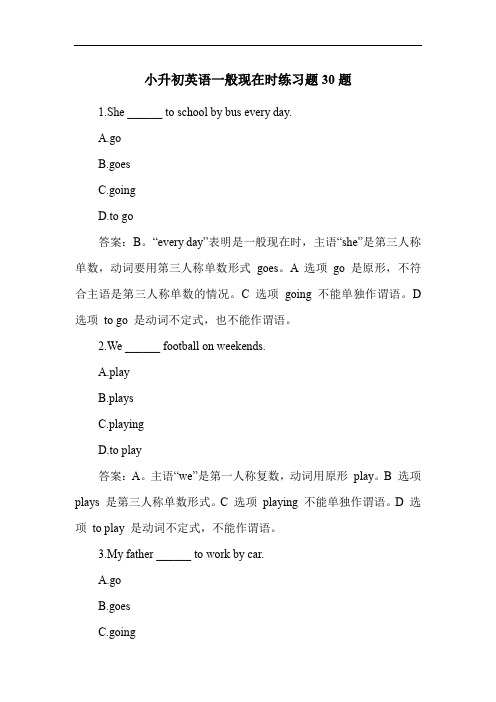
小升初英语一般现在时练习题30题1.She ______ to school by bus every day.A.goB.goesC.goingD.to go答案:B。
“every day”表明是一般现在时,主语“she”是第三人称单数,动词要用第三人称单数形式goes。
A 选项go 是原形,不符合主语是第三人称单数的情况。
C 选项going 不能单独作谓语。
D 选项to go 是动词不定式,也不能作谓语。
2.We ______ football on weekends.A.playB.playsC.playingD.to play答案:A。
主语“we”是第一人称复数,动词用原形play。
B 选项plays 是第三人称单数形式。
C 选项playing 不能单独作谓语。
D 选项to play 是动词不定式,不能作谓语。
3.My father ______ to work by car.A.goB.goesC.going答案:B。
主语“my father”是第三人称单数,动词要用第三人称单数形式goes。
A 选项go 是原形,不符合。
C 选项going 不能单独作谓语。
D 选项to go 是动词不定式,不能作谓语。
4.They ______ TV in the evening.A.watchB.watchesC.watchingD.to watch答案:A。
主语“they”是第三人称复数,动词用原形watch。
B 选项watches 是第三人称单数形式。
C 选项watching 不能单独作谓语。
D 选项to watch 是动词不定式,不能作谓语。
5.My mother ______ cooking every day.A.likeB.likesC.likingD.to like答案:B。
主语“my mother”是第三人称单数,动词要用第三人称单数形式likes。
A 选项like 是原形,不符合。
小升初英语语法之一般现在时

小升初英语衔接--一般现在时一.一般现在时的功能:1.表示事物或人物的特征、状态:如:天空是蓝色的。
2.表示经常性或习惯性的动作:如:我每天六点起床。
3.表示客观现实:如:地球绕着太阳转。
二. 一般现在时的构成:1. be动词:主语+be( / / )+其它。
如:I am a boy.我是一个男孩。
2.行为动词:主语+行为动词(+其它)。
如:We study English.我们学习英语。
当主语为第三人称单数时,要在动词后加" "或" "。
如:Mary Chinese.玛丽喜欢汉语。
三.一般现在时的变化:1. be动词的变化。
(1) 否定句:主语+ be + not +其它。
He is a farmer. (变为否定句)(2) 一般疑问句:Be +主语+其它。
如:回答:(3) 特殊疑问句:疑问词+一般疑问句。
如:Where is my bike?2.行为动词的变化。
(1) 否定句:主语+ don't( doesn't ) +动词原形(+其它)。
当主语为第三人称单数时,要用doesn't构成否定句。
(2) 一般疑问句:Do( Does ) +主语+动词原形+其它。
(3) 当主语为第三人称单数时,要用does构成一般疑问句。
I play football every day.(改为否定句)(改为一般疑问句及回答)He plays football every day.(改为否定句)(改为一般疑问句及回答)(4)特殊疑问句:疑问词+一般疑问句。
如:How does your father go to work?四.三单做主语时,动词加s的变化规则:1.一般情况下,直接加-s:cook-- like-- want2.以s.x.sh.ch.o.结尾,加-es:wash-- watch-- go-- miss--3.以辅音字母+y结尾,变y为i,在加-es:study-- fly-- carry--4.不规则的有,have-- be--实战演练一、写出下列动词第三人称单数的变化形式;be-- have-- come-- go--stay-- teach-- write-- take--study-- watch-- fly -- play--二、用括号内动词的适当形式填空。
小升初英语时态10句总结
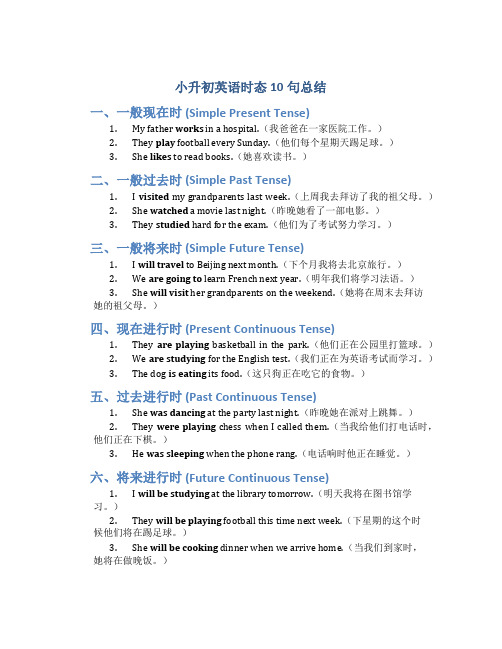
小升初英语时态10句总结一、一般现在时 (Simple Present Tense)1.My father works in a hospital.(我爸爸在一家医院工作。
)2.They play football every Sunday.(他们每个星期天踢足球。
)3.She likes to read books.(她喜欢读书。
)二、一般过去时 (Simple Past Tense)1.I visited my grandparents last week.(上周我去拜访了我的祖父母。
)2.She watched a movie last night.(昨晚她看了一部电影。
)3.They studied hard for the exam.(他们为了考试努力学习。
)三、一般将来时 (Simple Future Tense)1.I will travel to Beijing next month.(下个月我将去北京旅行。
)2.We are going to learn French next year.(明年我们将学习法语。
)3.She will visit her grandparents on the weekend.(她将在周末去拜访她的祖父母。
)四、现在进行时 (Present Continuous Tense)1.They are playing basketball in the park.(他们正在公园里打篮球。
)2.We are studying for the English test.(我们正在为英语考试而学习。
)3.The dog is eating its food.(这只狗正在吃它的食物。
)五、过去进行时 (Past Continuous Tense)1.She was dancing at the party last night.(昨晚她在派对上跳舞。
)2.They were playing chess when I called them.(当我给他们打电话时,他们正在下棋。
小升初英语语法:一般现在时

16. She _g_o_e_s__ (go) to school from Monday to Friday.
“辅音字母+y”结尾 变y为i, 再加-es,
fly—flies
特殊情况
have→has do→does go→goes
4、实义动词的一般现在时的基本句型
1) 肯定句:
☺主语(I/We/You/They)+实义动词原形+其他 如:I stay at home on Saturdays. They have sports every day.
回顾一
一般现在时的含义
一般现在时表示经常性或习惯性的动作或存在 的状态等。它通常和表示时间状语连用。
例如: Tom goes to school at 7:30 in the morning.
基本用法
1. 表示现在的情况或状态,或者经常性、习 惯性的动作或状态
I wash the dishes every day. You sometimes take a bus home. They usually have lunch at 11:30. He always gets up early. She is often late for school.
I will visit him when I am free. 我有空就去拜访他。 We will have picnic if it doesn't rain tomorrow. 如果明天不下雨,我们就去野餐。 b.表示按规定,计划,时间要发生的动作。 The plane takes off at 11:00. 飞机11点起飞。 c.表示客观性很强的将来。 Today is Wednesday,so tomorrow is Thursday. 今天是星期三,所以明天是星期四。
小升初英语时态信号词

小升初英语时态信号词小升初必考时态的信号词一、一般现在时(一现)1)一个动作由百分之百到百分之零变化的频率副词,在句子中做时间状语。
always 总是, usually 通常,often 经常, sometimes 有时, seldom 很少, never 从不位置:a)be之后,行之前,情助于行之间。
b) sometimes 既可以置于句首,句中,也可以置于句尾。
2) every 短语:every day 每天,every week 每周,every month 每月,every season 每季,every year 每年位置:常位于局尾,有时为了强调时间也置于句首,但置于句首时,后要加逗号。
特词:how often 多久一次3)次数+时间:three times a day 一周三次,once a week 一周一次,twice a month 一月两次位置:常置于句尾4)on+星期s:每逢周几,常置于句尾,偶置于句首。
特词:how often 多久一次二、一般过去时(一过)1)今天(需要有参照时间)this morning 今天上午,this afternoon今天下午,this evening今天傍晚,tonight今晚2) 昨天:yesterdayyesterday morning ,yesterday afternoon,yesterday evening, last night3) 前天:the day before yesterdaythe day before yesterday in the morning, the day beforeyesterday in the afternoon,the day before yesterday in the evening4) last 短语last night, last week, last month, last season, last year5) the 名词+before lastthe night before last, the week before last, the month before last, the season before last, the year before last6) 时间段+ago: two days ago, five years ago7) 其他信号词:several days ago = the other day, just now刚才8)in+年份:特词:when三、一般将来时(一将)1)今天(需要有参照时间)this morning 今天上午,this afternoon今天下午,this evening今天傍晚,tonight今晚2)明天:tomorrowtomorrow morning,tomorrow afternoon,tomorrow evening3) 后天:the day after tomorrowthe day after tomorrow in the morning,the day after tomorrow in the afternoon,the day after tomorrow in the evening4)next短语next night,next week,next month,next season,next year5)the 名词+after nextthe night after next, the week after next, the month after next, the season after next , the year after next 6)in 时间段’s time / in 时间段’s / in 时间段两天后:in two days’time,in two days’,in two days,特词用how soon多久7)其他信号词soon不久,in the future在将来,in future = from now on 从现在起四、现在进行时(现进)1)句首:look,listen 2)句中:still3)句尾:now,at the moment,at the time4)其他:these days这些天,be quiet安静,be quick快点,Don’t make much noise不要制造太多噪音,be careful小心,at present目前。
小升初英语一般现在时疑问句练习题40题含答案解析
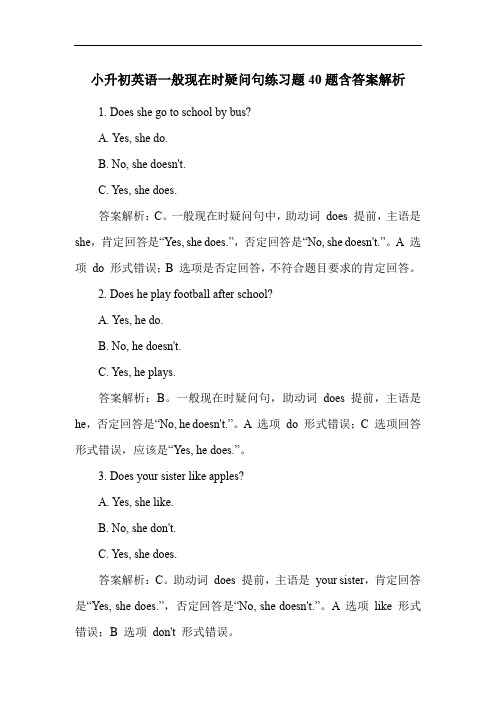
小升初英语一般现在时疑问句练习题40题含答案解析1. Does she go to school by bus?A. Yes, she do.B. No, she doesn't.C. Yes, she does.答案解析:C。
一般现在时疑问句中,助动词does 提前,主语是she,肯定回答是“Yes, she does.”,否定回答是“No, she doesn't.”。
A 选项do 形式错误;B 选项是否定回答,不符合题目要求的肯定回答。
2. Does he play football after school?A. Yes, he do.B. No, he doesn't.C. Yes, he plays.答案解析:B。
一般现在时疑问句,助动词does 提前,主语是he,否定回答是“No, he doesn't.”。
A 选项do 形式错误;C 选项回答形式错误,应该是“Yes, he does.”。
3. Does your sister like apples?A. Yes, she like.B. No, she don't.C. Yes, she does.答案解析:C。
助动词does 提前,主语是your sister,肯定回答是“Yes, she does.”,否定回答是“No, she doesn't.”。
A 选项like 形式错误;B 选项don't 形式错误。
4. Does your brother watch TV in the evening?A. Yes, he do.B. No, he doesn't.C. Yes, he watches.答案解析:B。
一般现在时疑问句,助动词does 提前,主语是your brother,否定回答是“No, he doesn't.”。
A 选项do 形式错误;C 选项回答形式错误,应该是“Yes, he does.”。
小升初语法辨析一般现在时一般过去时一般将来时(讲义)人教PEP版英语六年级下册

小升初英语语法辨析:一般现在时、一般过去时、一般将来时&专项模拟练习一、一般现在时1.定义:表示经常发生的动作、存在的状态或普遍真理。
2.时间标志词:often(经常)、usually(通常)、always(总是)、sometimes(有时)、every day/week/month/year(每天/ 周/ 月/ 年)等。
3.结构:1.主语(非第三人称单数)+ 动词原形。
例如:You play basketball afterschool.(你放学后打篮球。
)2.主语(第三人称单数)+ 动词的第三人称单数形式。
例如:He playsbasketball after school.(他放学后打篮球。
)4.用法:1.表示经常性或习惯性的动作。
如:I go to school by bike every day.(我每天骑自行车去上学。
)2.表示现在的状态或特征。
如:She is tall and thin.(她又高又瘦。
)3.表示客观事实或普遍真理。
如:The earth moves around the sun.(地球绕着太阳转。
)二、一般过去时1.定义:表示过去某个时间发生的动作或存在的状态。
2.时间标志词:yesterday(昨天)、last week/month/year(上周/ 上个月/ 去年)、ago(……以前)、in + 过去的年份等。
3.结构:主语+ 动词的过去式。
例如:You played basketball yesterday.(你昨天打了篮球。
)4.用法:1.表示过去某个时间发生的动作。
如:I went to the park last Sunday.(我上周日去了公园。
)2.表示过去存在的状态。
如:He was happy yesterday.(他昨天很开心。
)三、一般将来时1.定义:表示将来某个时间要发生的动作或存在的状态。
2.时间标志词:tomorrow(明天)、next week/month/year(下周/ 下个月/ 明年)、in the future(在未来)等。
小升初英语重点归纳语法知识(英语动词4种时态)
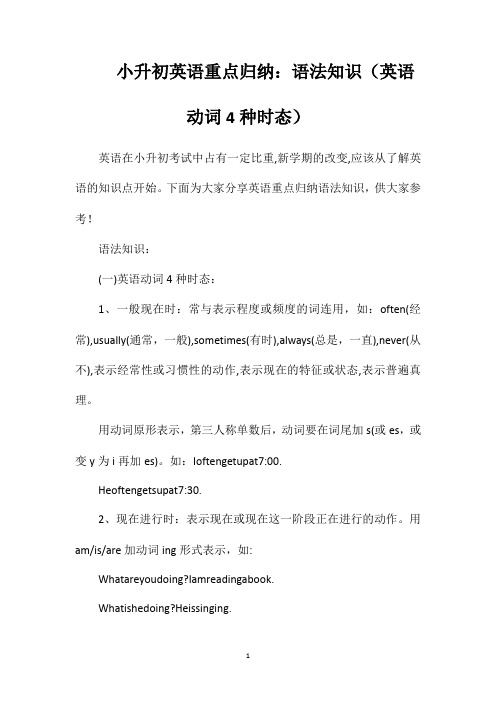
小升初英语重点归纳:语法知识(英语动词4种时态)英语在小升初考试中占有一定比重,新学期的改变,应该从了解英语的知识点开始。
下面为大家分享英语重点归纳语法知识,供大家参考!语法知识:(一)英语动词4种时态:1、一般现在时:常与表示程度或频度的词连用,如:often(经常),usually(通常,一般),sometimes(有时),always(总是,一直),never(从不),表示经常性或习惯性的动作,表示现在的特征或状态,表示普遍真理。
用动词原形表示,第三人称单数后,动词要在词尾加s(或es,或变y为i再加es)。
如:Ioftengetupat7:00.Heoftengetsupat7:30.2、现在进行时:表示现在或现在这一阶段正在进行的动作。
用am/is/are加动词ing形式表示,如:Whatareyoudoing?Iamreadingabook.Whatishedoing?Heissinging.3、一般将来时:常与表示将来的时间连用,如:tomorrow,nextweek,nextyear等,表示将要发生的动作或情况。
用am/is/are加goingto形式表示,如:Whatareyougoingtodotomorrow?I;;mgoingtorideahorse.用will加动词原形表示,如:WhatwillyoudonextSunday?Iwillgoshopping.用am/is/are加动词ing形式表示,如:Whatareyoudoingtomorrow?I;;mgoingbowling.4、一般过去时:经常与表示过去的时间连用,如:yesterday,lastnight 等,表示过去某时发生的动作或情况。
动词要用动词的过去式。
如:Whowasfirst?Kenwasfirst.Wherewereyouyesterday?Iwasathome.Whatdidyoudoyesterday?Iwenttoschool.以上是为大家分享的英语重点归纳语法知识,希望对大家有所帮助!2017精选小升初英语知识点讲解:名词备战小升初英语名词复数规则语法考点。
小升初英语一般现在时疑问句练习题40题(答案解析)
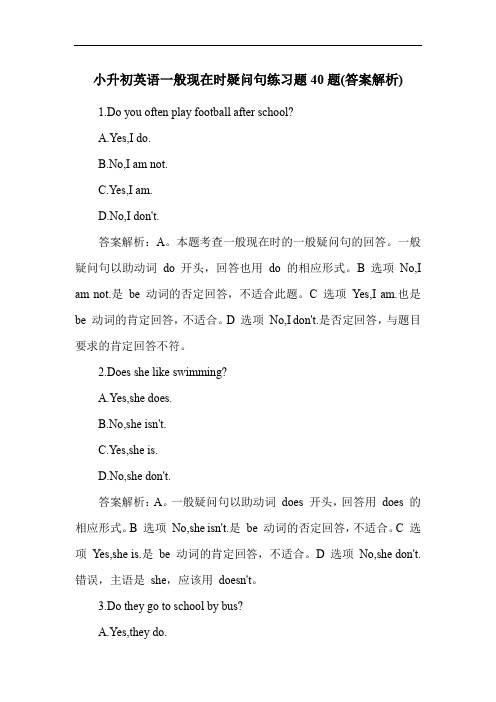
小升初英语一般现在时疑问句练习题40题(答案解析)1.Do you often play football after school?A.Yes,I do.B.No,I am not.C.Yes,I am.D.No,I don't.答案解析:A。
本题考查一般现在时的一般疑问句的回答。
一般疑问句以助动词do 开头,回答也用do 的相应形式。
B 选项No,I am not.是be 动词的否定回答,不适合此题。
C 选项Yes,I am.也是be 动词的肯定回答,不适合。
D 选项No,I don't.是否定回答,与题目要求的肯定回答不符。
2.Does she like swimming?A.Yes,she does.B.No,she isn't.C.Yes,she is.D.No,she don't.答案解析:A。
一般疑问句以助动词does 开头,回答用does 的相应形式。
B 选项No,she isn't.是be 动词的否定回答,不适合。
C 选项Yes,she is.是be 动词的肯定回答,不适合。
D 选项No,she don't.错误,主语是she,应该用doesn't。
3.Do they go to school by bus?A.Yes,they do.B.No,they aren't.C.Yes,they are.D.No,they doesn't.答案解析:A。
一般疑问句以助动词do 开头,回答用do 的相应形式。
B 选项No,they aren't.是be 动词的否定回答,不适合。
C 选项Yes,they are.是be 动词的肯定回答,不适合。
D 选项No,they doesn't.错误,主语是they,应该用don't。
4.Does he watch TV in the evening?A.Yes,he do.B.No,he isn't.C.Yes,he does.D.No,he don't.答案解析:C。
小升初英语语法知识点-一般现在时讲义 (全国通用版)

小升初一般现在时讲义一般现在时定义1.表示事物或人物的特征、状态。
如:Tom is tall. Tom长得很高。
Those flowers are red. 那些花是红色的。
2.表示经常性或习惯性的动作。
如:I usually get up at eight o’clock.我通常在八点起床。
He lives in Beijing. 他住在北京。
3.表示客观真理。
如:The earth goes around the sun.地球绕着太阳转。
Summer comes after spring.春去夏来。
一般现在时的构成①当谓语动词是be动词时,构成为:主语+be动词(am,is,are)+其他。
如:They are my friends.他们是我的朋友。
①当主语是行为动词时,构成有两种:(1)主语(非第三人称单数)+动词原形+其他。
如:We often go to the park at weekends.我们经常在周末去公园。
(2)主语(第三人称单数)+动词第三人称单数形式+其他。
如:Tim usually plays basketball after school.Tim通常会在放学后打篮球。
①句型变换(难点)如何把陈述句改为一般疑问句?可以按照以下步骤:1. 在陈述句中寻找is\am\are\can\will这几个单词I am a student.She is a beautiful girl.He is a strong boy.They are cute dogsI can swim very well.I will go to Beijing this summer.2.若句子中出现is\am\are\can\will几个单词,就直接把这几个单词放到句子的最前面,后面句子照抄,注意大小写字母的变化,并把句点改为问号。
I am a student.→Are you a student?(I am 是特殊的,通常用Are you…?进行提问)She is a beautiful girl.→Is she a beautiful girl ?He is a strong boy.→ Is he a strong boy?They are cute dogs.→ Are they cute dogs?I can swim very well.→Can you swim very well?(句子中出现I,都要改成you)I will go to Beijing this summer.→Will you go to Beijing this summer?3.若句子中没有出现以上几个单词,就要用助动词do\ does来进行提问,放在句子的最前面。
小升初英语语法专项:一般现在时(课件+练习)

1、表示现在或是经常存在的状态。
Hello! I’m Peppa Pig. I’m a little pig. I’m four years old.
Hello! I’m Peppa Pig. I’m a little pig. I’m four years old. I like playing with my best friend Suzy Sheep, visiting Granny and Grandpa Pig and looking after George.I love jumping up and down in muddy puddles, laughing and snorting noises. I get up at seven o'clock. I go to school at eight o'clock. I go to bed at nine.
carry carries
4. 特殊情况:
have has
go goes
do does
Practice
gscwcptufagodareiroxsoyasrkhsyk
+s
+es
去y加ies
特殊情况
Exercises
选词填空:
1.What__d_o_e_s___(do/does) your sister like doing? 2.Your father___h_a_s___ (has/have) got a new job. 3.I ___w_a_n_t__(want/wants) to visit the Changjiang River. 4.This dog___h_e_lp_s__ (help/ helps)the blind man. 5.____I_s___(Is;Do)it a big city? 6.They ___a_r_e___ (is/ are) not Lingling's toys. 7.—What ___d_o____(do / does) you have at school on Monday? —I___h_a_v_e__(have / has) English, Maths and Chinese. 8.She __g_o_e_s___ (go / goes) swimming at the weekend. 9.Berry often _w__a_sh_e__s_ (washes/washing) her dress on Sunday. 10.She __w_o_r_k_s__ (work/ works) in a factory.
小升初英语专项复习第12讲:一般现在时 外研版一起
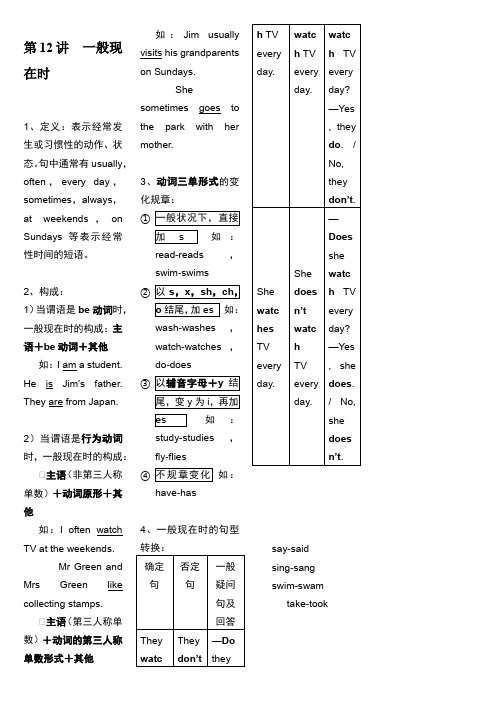
第12讲一般现在时
1、定义:表示经常发生或习惯性的动作、状态。
句中通常有usually,often,every day,sometimes,always,
at weekends,on Sundays等表示经常性时间的短语。
2、构成:
1)当谓语是be动词时,一般现在时的构成:主语+be动词+其他
如:I am a student. He is Jim’s father. They are from Japan.
2)当谓语是行为动词时,一般现在时的构成:
①主语(非第三人称单数)+动词原形+其他
如:I often watch TV at the weekends.
Mr Green and Mrs Green like collecting stamps.
①主语(第三人称单数)+动词的第三人称单数形式+其他
如:Jim usually
visits his grandparents
on Sundays.
She
sometimes goes to
the park with her
mother.
3、动词三单形式的变
化规章:
①
如:
read-reads,
swim-swims
②
如:
wash-washes,
watch-watches,
do-does
③
如:
study-studies,
fly-flies
④如:
have-has
4、一般现在时的句型
转换:say-said
sing-sang
swim-swam
take-took。
小升初语法专题讲练第18讲:一般现在时

小升初语法第18讲:一般现在时知识点讲解与考题精练(有答案)【考点解读】英语中,人们在句子表达的过程中,随着时间的变化,谓语动词的形式会发生相应的变化,称之为时态。
动词时态共有十六种,小升初常考的时态有四种:一般现在时;一般将来时;一般过去时;现在进行时。
小升初考试中要求掌握四种时态的概念、动词变化规则、标志词、句型变化等,重点民办学校在分班考中都会涉及四种时态的用法。
【知识讲解1】小学阶段时态汇总【知识讲解2】一般现在时1.现阶段存在的状态;现在时刻内经常性、习惯性的动作。
2.用法(1)经常性或习惯性的动作。
例如:It seldom snows in Suqian now.(2)现在的情况或状态。
例如:He loves sports.(3)表示现在的能力、特征、职业等。
如:I am a teacher.(4)表示客观真理、科学事实、格言以及不受时间限制的客观存在。
如:Light travels faster than sound.(5)在if, when, as soon as, until, after, before等连接词引导的时间或条件状语从句中,从句中谓语动词要用一般现在时,主句要用将来时。
例如:Turn off the light before you leave.We will start as soon as you are ready.(6)表示按规定、计划、安排或时间表将要发生的情况,如用于火车、飞机等定期定点运行的交通方式中,表示按时刻表安排将要发生的动作或状态,涉及到一些动词,如:begin, start, stop, arrive, come, go, leave, return, open, close, be等代替将来时。
如:My plane leaves at 11 a.m. tomorrow.3.标志词★频度副词:often, usually, always, sometimes, never, seldom,once a week, twice a year,★时间词组:every week/day/year/month...on Sundays,in January,in the morning等。
小升初英语语法解析:一般现在时

小升初英语语法解析:一般现在时小升初的英语考试内容涉及并不多,下面就是小编给大家带来的小学英语语法一般现在时的语法解析,希望能帮助到大家!小升初英语语法解析:一般现在时一:定义一般现在时 (The simple present tense) :一般现在时表示现在经常反复发生的动作,存在的状态或习惯性的动作的时态。
二、一般现在时的用法:1.表示经常或习惯性的动作。
常与often(经常), always(总是), sometimes(有时), every day(每天)on Sundays/Mondays 等表示频度的时间状语连用。
一般现在时的时间状语有:today, often, sometimes, always, usually, every day ( week, month, year,…), this year, once a week ( month, year, …)例句:I get up at 6 o’clock every day. 我每天早上6点钟起床。
He often goes to school by bike. 他经常骑自行车去学校。
2. 表示客观事实,普遍真理。
例句:Two and two is four. 二加二等于四。
The earth moves around the sun. 地球绕着太阳转。
三、一般现在时的结构:一般现在时用行为动词的原形,但第三人称单数作主语时,动词的词尾要加-s 或 - es。
以下将对一般现在时的肯定句、否定句、疑问句及其答语的构成加以说明:A、当谓语是be动词时,构成为:肯定句:主语 + be动词 ( am, is, are ) + 其他。
I am a student.否定句:主语+be动词 ( am, is, are ) + not +其他。
I am not a student.疑问句:be动词 ( am, is, are ) + 主语 + 其他? Am I a student?肯定回答:Yes,主语 + be动词 ( am, is, are ) Yes, I am.否定回答:No,be动词 ( am, is, are ) + not. No, I am not.B、当谓语是行为动词时,构成有两种:(1)当主语为非第三人称单数时:肯定句:主语+动词原形+其它We watch TV at home.否定句:主语+don't+动词原形+其它We don’t watch TV at home.一般疑问句:Do+主语+动词原形+其它Do we watch TV at home?肯定回答:Yes,主语+doYes, we do.否定回答:No,主语+don'tNo, we don’t.(2)当主语是第三人称单数时:肯定句:主语+动词s+其它She reads books.否定句:主语+doesn't+动词原形+其它She doesn’t read books.一般疑问句:Does+主语+动词原形+其它Does she read books?肯定回答: Yes,主语+does.Yes, she does.否定回答: No,主语+doesn't.No, she doesn’t.四、动词加-s 或-es (动词第三人称单数):当主语是第三人称单数时,谓语动词需用动词的“三单变化”加-s 或-es。
小升初语法23-一般现在时
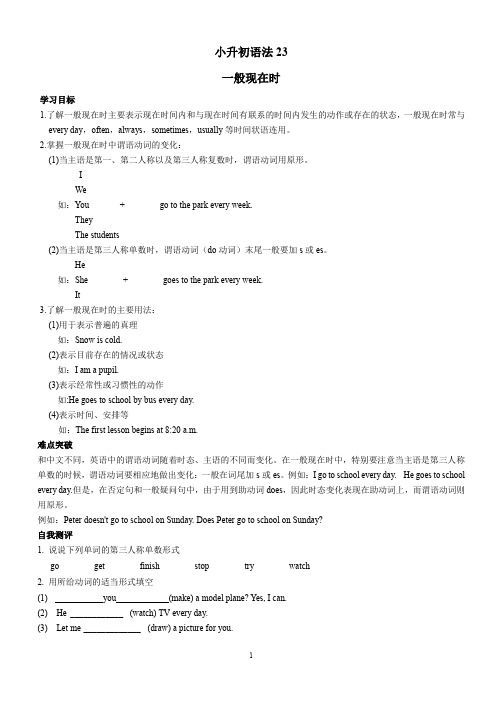
小升初语法23一般现在时学习目标1.了解一般现在时主要表示现在时间内和与现在时间有联系的时间内发生的动作或存在的状态,一般现在时常与every day,often,always,sometimes,usually等时间状语连用。
2.掌握一般现在时中谓语动词的变化:(1)当主语是第一、第二人称以及第三人称复数时,谓语动词用原形。
IWe如:You + go to the park every week.TheyThe students(2)当主语是第三人称单数时,谓语动词(do动词)末尾一般要加s或es。
He如:She + goes to the park every week.It3.了解一般现在时的主要用法:(1)用于表示普遍的真理如:Snow is cold.(2)表示目前存在的情况或状态如:I am a pupil.(3)表示经常性或习惯性的动作如:He goes to school by bus every day.(4)表示时间、安排等如:The first lesson begins at 8:20 a.m.难点突破和中文不同,英语中的谓语动词随着时态、主语的不同而变化。
在一般现在时中,特别要注意当主语是第三人称单数的时候,谓语动词要相应地做出变化:一般在词尾加s或es。
例如:I go to school every day. He goes to school every day.但是,在否定句和一般疑问句中,由于用到助动词does,因此时态变化表现在助动词上,而谓语动词则用原形。
例如:Peter doesn't go to school on Sunday. Does Peter go to school on Sunday?自我测评1. 说说下列单词的第三人称单数形式go get finish stop try watch2. 用所给动词的适当形式填空(1) you (make) a model plane? Yes, I can.(2) He ____________ (watch) TV every day.(3) Let me _____________ (draw) a picture for you.(4) How _____________ your mother____________ (go) to work every day?(5) They like _____________ (listen) to the music.(6) I (be) a boy of Grade Four.3. 选择填空( ) (1) He eats his breakfast 7:00 in the morning.A. onB. inC. at( ) (2) How many bananas in the bag?A. is thereB. are thereC. they are( ) (3) What ________ you want?A. doB. haveC. does( ) (4) These shirts are so nice but ________ quite cheap.A. theyB. it isC. they are( ) (5) Does Mike _________ ice-cream?A. likeB. likesC. liking( ) (6) What _________ Linda got?A. hasB. haveC. does( ) (7) Danny wants a new pen. He __________like his old one.A. doesn'tB. isC. do( ) (8) Can I have some milk, please? Here you __________ .A. isB. areC. some( ) (9) It's not hot now. Please the door.A. closeB. nodC. open( ) (10) What _________ your mother need?A. doB. doesC. has4. 听短文,填入所缺的词Jimmy and I twins. Every day we school on foot. We study in the same school, we in the same class. We lunch at school. We go home at 5 o' clock.(1) What's my friend's name?(2)What time does Meg get up?(3)What does Meg eat for breakfast?(4)Does Meg go to school at seven o'clock?(5)What does Meg do at nine o'clock every evening?趣味阅读A StoryOne morning, the hare and the tortoise have a race. At first the hare runs very fast. He is far ahead of the tortoise. He sits under a tree and soon he falls asleep. The tortoise keeps on running hard. At last the tortoise wins the race. He says to the hare: "Mr. Hare, you can run faster than me. But I got here first." The hare's face turns red.根据短文内容回答问题1. Who is having a race?2. Does the hare run fast at first?3. At last who wins the race?_______________________________________________________________________________________4. Why can the tortoise win the race?5. How does the hare feel?Keys:1. 略。
小升初英语一般现在时练习题30题答案解析版

小升初英语一般现在时单选题30题答案解析版1.He often ______ basketball after school.A.playB.playsC.playingD.to play答案:B。
主语he 是第三人称单数,一般现在时动词要用第三人称单数形式plays。
一般现在时中,当主语是第三人称单数时,动词要发生变化。
2.They ______ books every day.A.readB.readsC.readingD.to read答案:A。
主语they 是复数,一般现在时动词用原形read。
一般现在时中,主语是复数或第一、二人称时,动词用原形。
3.My sister ______ to music in her free time.A.listenB.listensC.listeningD.to listen答案:B。
主语my sister 是第三人称单数,动词用第三人称单数形式listens。
一般现在时中,第三人称单数作主语,动词要变化。
4.We ______ TV on weekends.A.watchB.watchesC.watchingD.to watch答案:A。
主语we 是复数,动词用原形watch。
一般现在时,复数主语用动词原形。
5.My father ______ newspapers in the morning.A.readB.readsC.readingD.to read答案:B。
主语my father 是第三人称单数,动词用第三人称单数形式reads。
一般现在时,第三人称单数主语动词变化。
6.I ______ my homework in the evening.A.doB.doesC.doingD.to do答案:A。
主语I 是第一人称,动词用原形do。
一般现在时,第一人称用动词原形。
7.She ______ swimming in summer.A.goB.goesC.goingD.to go答案:B。
小升初英语时态信号词
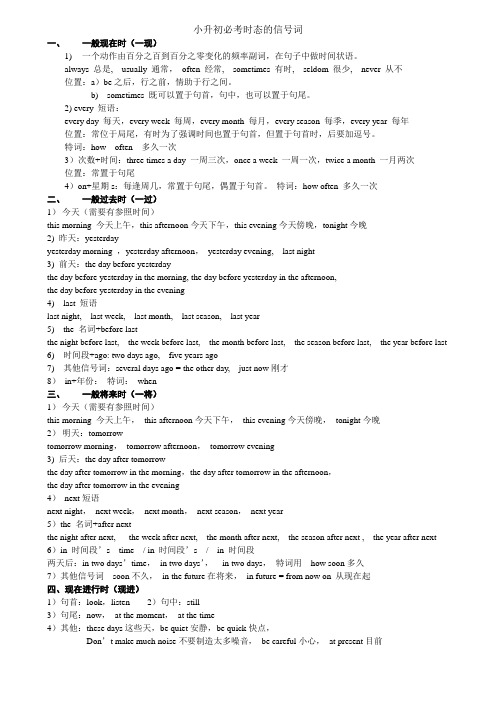
小升初必考时态的信号词一、一般现在时(一现)1)一个动作由百分之百到百分之零变化的频率副词,在句子中做时间状语。
always 总是, usually 通常,often 经常, sometimes 有时, seldom 很少, never 从不位置:a)be之后,行之前,情助于行之间。
b) sometimes 既可以置于句首,句中,也可以置于句尾。
2) every 短语:every day 每天,every week 每周,every month 每月,every season 每季,every year 每年位置:常位于局尾,有时为了强调时间也置于句首,但置于句首时,后要加逗号。
特词:how often 多久一次3)次数+时间:three times a day 一周三次,once a week 一周一次,twice a month 一月两次位置:常置于句尾4)on+星期s:每逢周几,常置于句尾,偶置于句首。
特词:how often 多久一次二、一般过去时(一过)1)今天(需要有参照时间)this morning 今天上午,this afternoon今天下午,this evening今天傍晚,tonight今晚2) 昨天:yesterdayyesterday morning ,yesterday afternoon,yesterday evening, last night3) 前天:the day before yesterdaythe day before yesterday in the morning, the day before yesterday in the afternoon,the day before yesterday in the evening4) last 短语last night, last week, last month, last season, last year5) the 名词+before lastthe night before last, the week before last, the month before last, the season before last, the year before last6) 时间段+ago: two days ago, five years ago7) 其他信号词:several days ago = the other day, just now刚才8)in+年份:特词:when三、一般将来时(一将)1)今天(需要有参照时间)this morning 今天上午,this afternoon今天下午,this evening今天傍晚,tonight今晚2)明天:tomorrowtomorrow morning,tomorrow afternoon,tomorrow evening3) 后天:the day after tomorrowthe day after tomorrow in the morning,the day after tomorrow in the afternoon,the day after tomorrow in the evening4)next短语next night,next week,next month,next season,next year5)the 名词+after nextthe night after next, the week after next, the month after next, the season after next , the year after next 6)in 时间段’s time / in 时间段’s / in 时间段两天后:in two days’time,in two days’,in two days,特词用how soon多久7)其他信号词soon不久,in the future在将来,in future = from now on 从现在起四、现在进行时(现进)1)句首:look,listen 2)句中:still3)句尾:now,at the moment,at the time4)其他:these days这些天,be quiet安静,be quick快点,Don’t make much noise不要制造太多噪音,be careful小心,at present目前。
小升初英语一般现在时疑问句单选题50题(含答案)
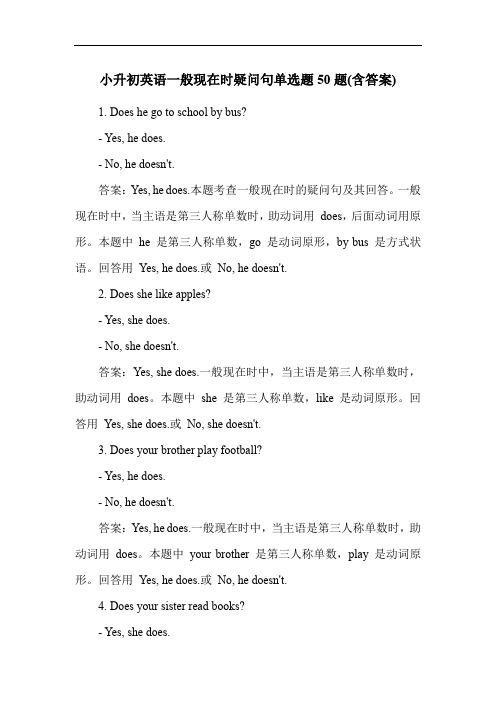
小升初英语一般现在时疑问句单选题50题(含答案)1. Does he go to school by bus?- Yes, he does.- No, he doesn't.答案:Yes, he does.本题考查一般现在时的疑问句及其回答。
一般现在时中,当主语是第三人称单数时,助动词用does,后面动词用原形。
本题中he 是第三人称单数,go 是动词原形,by bus 是方式状语。
回答用Yes, he does.或No, he doesn't.2. Does she like apples?- Yes, she does.- No, she doesn't.答案:Yes, she does.一般现在时中,当主语是第三人称单数时,助动词用does。
本题中she 是第三人称单数,like 是动词原形。
回答用Yes, she does.或No, she doesn't.3. Does your brother play football?- Yes, he does.- No, he doesn't.答案:Yes, he does.一般现在时中,当主语是第三人称单数时,助动词用does。
本题中your brother 是第三人称单数,play 是动词原形。
回答用Yes, he does.或No, he doesn't.4. Does your sister read books?- Yes, she does.- No, she doesn't.答案:Yes, she does.一般现在时中,当主语是第三人称单数时,助动词用does。
本题中your sister 是第三人称单数,read 是动词原形。
回答用Yes, she does.或No, she doesn't.5. Does your father go to work by car?- Yes, he does.- No, he doesn't.答案:Yes, he does.一般现在时中,当主语是第三人称单数时,助动词用does。
- 1、下载文档前请自行甄别文档内容的完整性,平台不提供额外的编辑、内容补充、找答案等附加服务。
- 2、"仅部分预览"的文档,不可在线预览部分如存在完整性等问题,可反馈申请退款(可完整预览的文档不适用该条件!)。
- 3、如文档侵犯您的权益,请联系客服反馈,我们会尽快为您处理(人工客服工作时间:9:00-18:30)。
They are going to play basketball We are swimming now.tom o rr o w.Tom played computer game yesterday. John does sports every day.英语时态就是用动词的形式变化来表示不同时间内发生的动作或存在的状态。
英语中,每一句话都至少包含一种时态,所以我们应该认识到时态的重要性。
小学阶段常见的时态有四种。
下面我们来一一地认识它们。
第一讲 一般现在时1.第一人称单数 (I) +amI am hungry. 我饿了。
_______________________________. 我是中国人。
2.第二人称单数 (you) /各人称复数 (We/you/they) +areYou are a handsome boy. 你是一个很帅的男孩子。
_______________________________. 他们现在很忙。
3.第三人称单数 (he/she/it) +isShe is a good teacher. 她是个很好的老师。
____________________. 它是我的宠物。
1.第三人称单数(he/she/it)+动词单三形式Ann gets up at 8 o’clock every morning. Ann 每天早上八点钟起床。
She studies hard. 她学习努力。
_______________________________________. 他每天晚上看电视。
2.第一/二人称单数(I /you)/各人称复数(we/you/they) You do well in English. 你英语学的很好。
They all run fast in the sports meeting. 他们在运动会上跑的都很快。
________________________________________. 我们想在周末去旅行。
动词第三人称单数形式变化规则:always, usually, often, sometimes, seldom (很少), never (决不), every day, at 8:30, on Sunday, in the morning 等。
如:I always get up at 6:00 in the morning. 我总是早上六点钟起床。
表示现在时刻的状态、能力、性格、个性。
如:She loves English very much. 她非常喜欢英语。
My sister can play the piano very well. 我妹妹钢琴弹的很好。
表示客观的事实或者格言警句。
如:The sun rises in the east. 太阳从东方升起。
Pride goes before a fall. 骄者必败。
一般现在时的一般疑问句是把助动词do, 或does 放在句首来引导。
1、如果句子的主语是I, we, you, they或复数名词时,用do来引导,其余句子的位置不变。
肯定回答:Yes, I/we/they do. 否定回答:No, I/we/they don’t.如:They go to school by bus every day.→______________________________________?→______________.(肯定回答)→______________.(否定回答)2、如果句子的主语是he, she, it 或单数名词时,用does 来引导,其余句子的位置不变,但是要把原来句子中的动词第三人称单数形式,改为动词原形。
肯定回答:Yes, he/she/it does. 否定回答: No, he/she/it doesn’t.如:He often goes to school by bike.→________________________________________?→_________________. (肯定回答)→_______________. (否定回答)一般现在时的否定句1.如果句子的主语是I, we, you, they或复数名词时,则在主语的后面加don’t。
如: We always go to school on foot.→_______________________________________.2.如果句子的主语是he, she, it或单数名词时,则在主语的后面加二、用do does填空。
1. _____ you ride a bike after school? Yes, I _______ .2. ______ your sister like P.E.? No, she ______ not.3. What ______ the students have? They have some pens.4. How _____ Linda go to school? She goes to school on foot.5. He ______ not speak English. He speaks Japanese.三、按照要求改写句子。
1. Mike watches TV every evening. (改为否定句)___________________________________________________2. I do my homework every day. (改为一般疑问句,作否定回答)___________________________________________________3. Amy likes playing computer games. (改为一般疑问句,作否定回答)___________________________________________________4. She likes milk. (改为一般疑问句,作肯定回答)___________________________________________________5. He speaks English very well. (改为否定句)___________________________________________________四、用所给词的适当形式填空。
1. ____ her sister ______ (have) a tennis racket?2. _____ your friend ______ (like) basketball?3. We _____ (play) football every day.4. It_____ (sound) very well.5. Jim _____ (want) an orange.6. My mother ______(watch)TV in the evening.7. ____ you _____ (like) English?8. Mike and Li Lei _______ (not like) eggs.9. What color_____ your sister______ (like)?10. She ______ (know) a little English.五、用be动词的适当形式填空。
1. ---How____ you? ---I____ fine.2. I___ David, and my family name___ Green.3. ---What color ___ your clock? ---It___ white.4. ---What___ this in English? ---It___ an apple.5. Toy ___ my brother. David____ my brother, too. They ___ my brothers.6. Look! These ____ apple trees.7. We____ good students and you____ good teacher.8. My sister and my brother_____ students.9. Five and three ____ eight.10. ____your card number 5578?一、单项选择。
1. _____ he _____ to the park at 6:30 in the morning? No, he _____ .A. Does; goes; doesB. Does; go; doesn’tC. Does; go; does2. Tim always _____ a picture at home. He _____ a car now.A. draws; is drawingB. draw; drawC. draws; draw3. She usually _____ her friends. They often _____ tea.A. see; drinkB. sees; drinksC. sees; drink4. He usually _____ the dishes at night, but tonight he _____ clothes.A. wash; washB. washes; is going to washC. is washing; washes5. Mr. Green usually _____ his newspaper in the evening, but he and his wife_____ television yesterday evening.A. reads; watchesB. reads; is going to watchC. reads; watched二、阅读理解。
My Little CatI love animals(动物)very much. But I love my little cat best. My little cat's name is Mimi. When I get home, she walks to me. When she feels hungry, she meows loudly (大声地).Now she's very fat.Mimi is very lovely .I like my little cat——Mimi.Read the following sentences, choose True (T) and False (F).仔细阅读,在下列句子前标上T(正确)或F(错误)。
